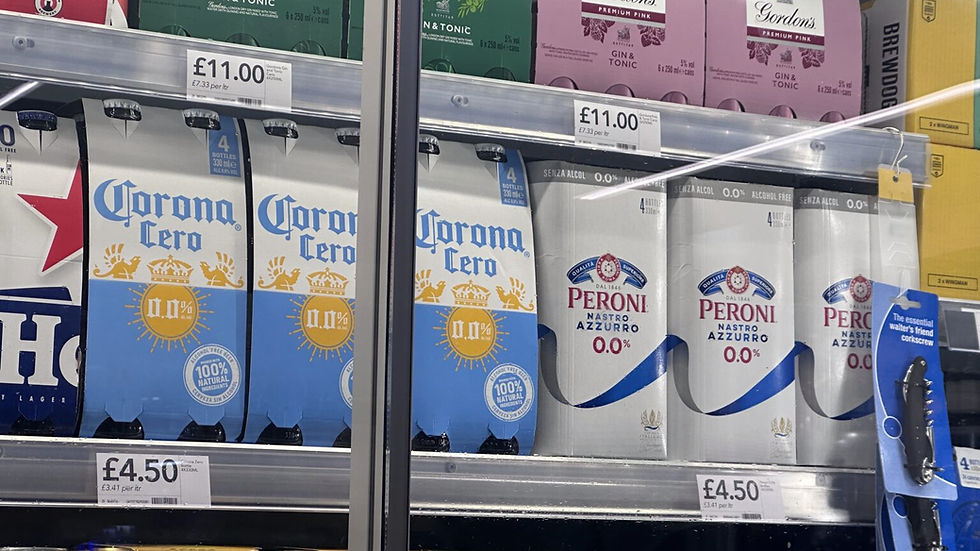New figures reveal Gen-Z as the 'Sober Generation'.
- southlivsurveyor
- Jan 28
- 4 min read
Updated: Jan 30
From embracing Dry January to facing financial challenges, young people are reshaping the UK's drinking culture.
Written by Kayleigh Cantrell

For many millennials, enjoying a pint on the weekend is an ideal way to spend their time off. However, it has been revealed that Gen Z is leading the way when it comes to sobriety.
A survey by trade body Portman Group and YouGov found that 39% of those aged 18 to 24 abstain from drinking entirely, citing changing attitudes towards health and relationships. But alcohol dependence still remains a critical issue in the UK, with 16% of adults reportedly binge drinking each week.

Bee Sober, a sobriety and well-being community, have been working closely with organisations and individuals to transform the mindset and beliefs around living an alcohol-free life.
Jennifer Dinnar, Bee Sobers Merseyside Ambassador, has been sober for five years after constantly feeling unwell and unmotivated.
She said: “I would get so carried away on nights out and wake up feeling rubbish. But once I gave up alcohol, I never looked back.”
“The Dry January 30-day challenge is what I did first. It wasn’t just about knuckling down for 30 days and celebrating at the end with a bottle of wine. It’s about educating yourself.”
Charity-driven initiatives, such as Dry January and Sober October, have played an important role in removing stigma. These campaigns encourage individuals to take a break from drinking, often leading to long-term lifestyle changes.
Jennifer said: “There is alcohol everywhere. You have to become open to trying new things and look for a new perspective. You’ll discover yourself and you’ll find out who you are and what you like.”
Social spaces, such as pubs and restaurants, have adapted to welcome individuals who choose not to drink. Alcohol-free venues, such as SipSin, and alternative beverage options have become valuable, mainstream choices.
In the Portman Group survey, 44% of 18 to 24 year-olds identified themselves as either occasional or regular consumers of alcohol alternatives, marking a 13% increase since 2022.
Matt Lambert, CEO of the Portman Group, said: “It is welcome to see a further rise in the popularity of low and no alcohol alternatives as well as further evidence of how they are an important tool to help UK drinkers, particularly younger adults, to drink responsibly.”

Data reveals that Liverpool has high rates of alcohol dependancy.
Celebrated for its bustling pub scene and vibrant nightlife, Merseyside offers lots to those who enjoy an alcoholic beverage. However, Public Health authorities found that Liverpool has the highest rates of alcohol dependency, with around 10,000 adults dependent on alcohol.
This data also shows that the gap in life expectancy between Liverpool residents and the rest of England for alcohol-related issues has increased by over 5% for men and 3% for women.
The city is determined to tackle the harmful impacts of alcohol by working with the Liverpool Community Alcohol Service (LCAS), which supports people in managing issues such as alcohol withdrawal. They also believe that reducing the affordability of alcohol could reduce issues. By partnering with regional and national establishments, Liverpool plans to further develop alcohol pricing in line with inflation.
Individuals aged 18 to 24 account for 13.72% of Liverpool's population, and this younger generation is at the forefront of reducing alcohol consumption. Many young people cite health, financial concerns, and mental health as reasons for reducing or eliminating their consumption.
Social media has also played a significant role in this shift, with platforms like Instagram and TikTok featuring local influencers who share their experiences of sobriety and advocate for an alcohol-free lifestyle. Notable sober content creators include Iwan Steffan and Charlotte Thomas.
In Liverpool, the variety of alcohol-free alternatives and events, such as creative workshops and theatrical plays, has enabled the industries to grow inclusivity.
Sober Scribbles is a music, poetry, and literature writing workshop aimed at those who are sober, sober-curious, or want to reframe their mindset with drinking. It allows individuals to put pen to paper and explore whatever is on their mind.
Poet and writer, Helen Jeffery, founded the program after conversations arose from a play she had written and directed on alcohol addiction.
The 50-year-old said: "We have perceptions about what alcohol dependancy looks like in society and it’s very negative. When we think of the word alcoholic, we think of somebody drinking all day or sat on a park bench with a brown paper bag and it is far from the truth.”
“It’s very stigmatising to call somebody an alcoholic. It’s demonising them.”
“Sobriety is no longer viewed as a sacrifice, but as an empowering lifestyle choice. The growing trend in cutting alcohol slightly or entirely is paving the way for a healthier society.”
The next workshop will take place online on February, 9th, 2025 and will be themed around ‘Love’. You can find out more here.
Sobriety is now viewed as an opportunity for self-improvement, enhanced relationships, and healthier living, allowing individuals to lead fulfilling lives. From national campaigns to growing popularity in sober spaces, the movement has grown, highlighting the strength of community, the power of choice, and the benefits of redefining what it means to live well.
You can check watch our video on this story below:
Do you often drink alcohol-free alternatives?
Yes
No
Featured Image (c) Kayleigh Cantrell
Credits to Bee Sober and Helen Jeffery







